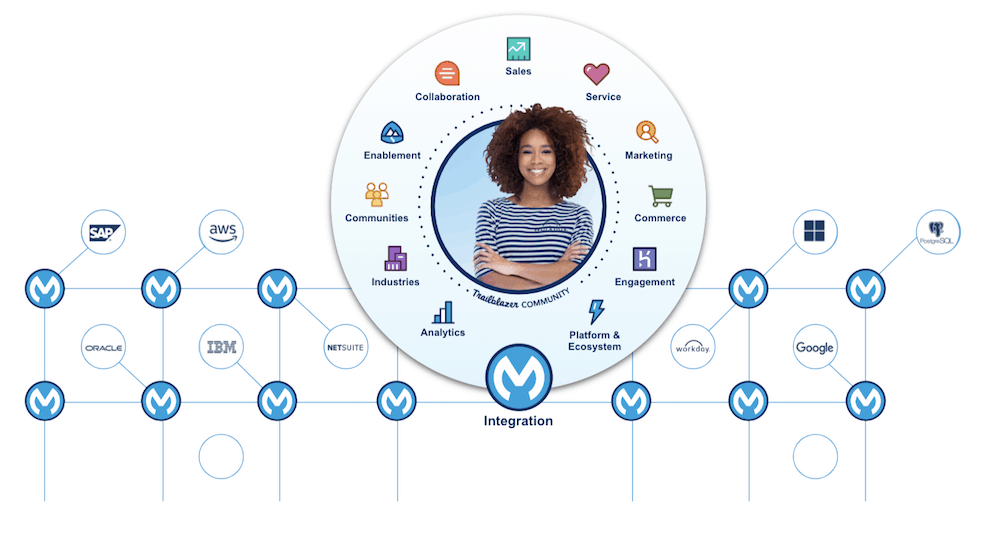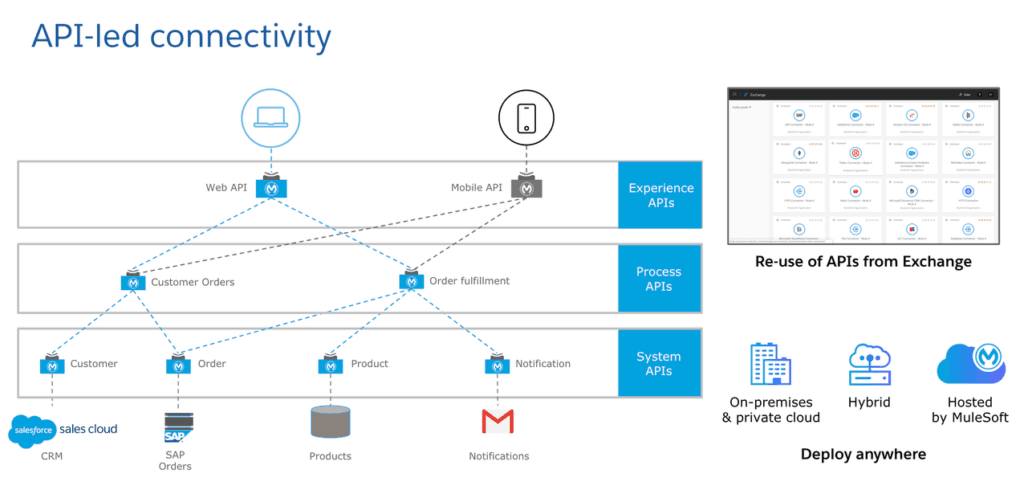Anypoint Platform enables organizations to synchronize data and automate transactions between ERP, Sales Cloud, and other systems, enabling connected sales experiences that increase sales productivity.
81% of sales reps believe it is important to have a connected view of data across the entire customer journey. However, a lack of integrated systems linking data sources is holding many businesses back. According to Salesforce’s latest State of Sales report, only 49% of businesses say they have fully integrated systems and high-performing sales teams are 2.1 times more likely than underperformers to have these integrated systems in place.
In MuleSoft’s latest Connectivity Benchmark Report we learned that on average, organizations use 900 applications — of those, only 29% typically connect or integrate. For example, inventory data in ERP, product information in a backend database, customer and account data in CRM, HR data in HCM solution, pricing is in CPQ, plus a multitude of other platforms across the enterprise for messaging, collaboration, reporting, and more.
When businesses have tried to connect these systems, it is typically using custom code or point-to-point integration. This becomes fragile, disorganized, and difficult to find information, and moreover, the app becomes tightly coupled with the project or to the underlying endpoints. If anything changes with the endpoints or the business requirements, the entire app or major portions of the code need to be rewritten.
And this is not just a back-office IT problem. It stops businesses from innovating and building new customer experiences. It prevents reuse and delays future projects. When a new requirement emerges for a mobile app that pulls the exact same information, the developers building the app aren’t able to leverage the work done for previous projects. Over time, changes become expensive or nearly impossible to make, effectively taking the business out of any competitive position they hope to maintain in their market.
So what is the result? For many companies, it means critical sales information like order history, contracts, fulfillment, and more are locked within disparate systems including ERP. Convincing customers to buy products and services is only part of the sales cycle, and many sales reps lack the tools to complete the entire transaction. Sending sales orders to a separate team to manually enter them in SAP is inefficient, and reps lack visibility if they can’t see fulfillment status within Salesforce. In today’s world, customers will choose to buy from companies who can serve them most quickly, efficiently, and accurately.
Integrating Sales Cloud with an API-led approach

And that’s where MuleSoft and Salesforce come in. MuleSoft enriches the Customer Success Platform by connecting the world’s applications, data, and devices, no matter where that data resides — inside or outside of Salesforce, on-premises, or in the cloud. By unlocking data across the enterprise with application networks, organizations can easily deliver new revenue channels, increase operational efficiency, and create differentiated customer experiences.

MuleSoft’s approach, called API-led connectivity, provides a platform for connecting and exposing assets. With this approach, rather than connecting things point-to-point, every asset becomes a managed and modern API, making them discoverable and available for the business to self-serve. API-led connectivity adds flexibility, allowing teams throughout the business to compose, recompose, and adapt these APIs to address the changing needs of the business.
MuleSoft’s Anypoint Platform enables organizations to synchronize data and automate transactions between ERP, Sales Cloud, and other systems, enabling connected sales experiences that increase sales productivity by 26%. With ERP and Sales Cloud integrated, customers can build automated order-to-cash processes with 3x faster order provisioning so that sales reps can focus on customers and selling instead of data entry.
Hologic, a leading global healthcare and diagnostics company, was able to accelerate integration by 3x through leveraging APIs with MuleSoft. To support its continued investment in improving customer experiences, Hologic decided to adopt Salesforce’s sales cloud, service cloud, and marketing cloud products. The goal: provide its growing sales and support teams with 360-degree customer views populated with real-time data. Constrained with a heavyweight integration stack that slowed development time, the IS team needed a faster way to deliver integrations in order to keep pace with the growing needs of the business.
The Hologic team has been able to increase the overall speed of development through their adoption of API-led connectivity, powered by MuleSoft’s Anypoint Platform. With MuleSoft, Hologic was able to develop reusable connectivity assets between Salesforce and other core systems to accelerate the delivery of current and future projects. For example, Hologic recently developed an integration between Salesforce CPQ and Oracle EBS that takes a product quote and converts it to a sales order. When the team needed to replicate this functionality for service and repair quotes, they were able to reuse many of the same assets developed for the initial integration. Furthermore, they’ve built a foundation of reusable assets that will help them accelerate the development of future projects.
Benefits of ERP and Sales Cloud integration:
- A connected selling experience: connect your ERP with Sales Cloud easily using out-of-the-box connectors and a robust library of Salesforce integration templates to speed up development.
- A single view of customers: consolidate information in real-time, with bi-directional synchronization templates, to ensure data consistency across applications, geographics, business units, and departments.
- Increased sales productivity: fuel smarter reporting and analytics with Sales Cloud Einstein, now connected with richer data from ERP and third-party systems to make your sales team more efficient.
Read our MuleSoft and Sales Cloud whitepaper or watch our latest webinar to learn how Anypoint Platform connects Sales Cloud to applications like SAP, Oracle, and NetSuite, allowing you to manage your complete business by unlocking your back office data through integration.









